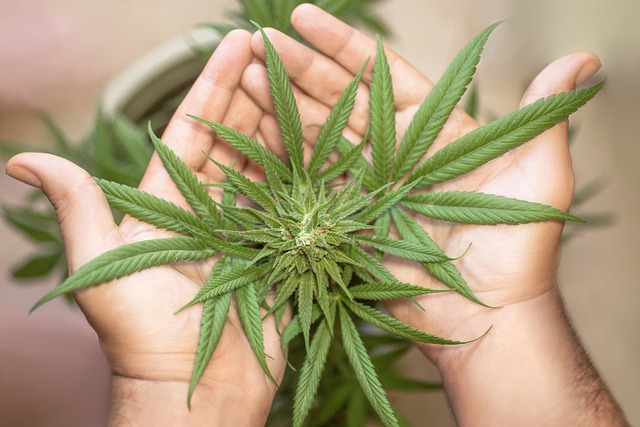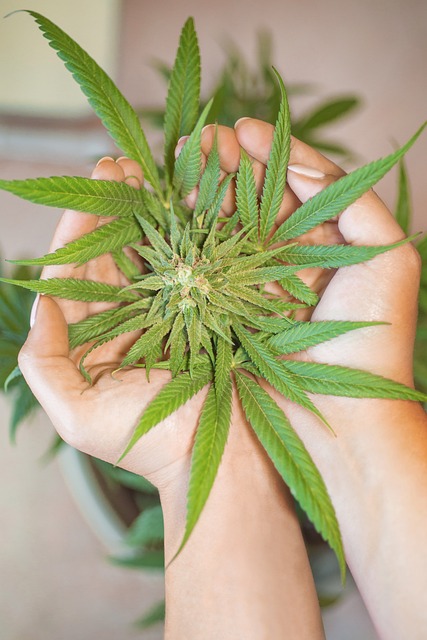2023 marked a significant milestone for THCA flower as it became legally recognized in California, leading to a surge in its popularity due to its non-psychoactive properties and wellness benefits. THCA, the precursor to THC, offers consumers a clear-headed experience without the psychoactive effects, making it a preferred choice within California's cannabis market. Its legalization has been a boon for those seeking potent therapeutic alternatives, with the state's diverse range of THCA products, including A1 and THCA strains, catering to various wellness needs. The growth of the hemp-derived THCA market further expands consumers' options. This year has underscored the importance of THCA flower as a significant player in California's post-legalization cannabis industry, with ongoing research into its health benefits, such as anti-inflammatory and analgesic properties, highlighting its potential within medical cannabis applications. As regulations continue to evolve, Californians are encouraged to consume responsibly, ensuring they adhere to the state's legal framework for safe and informed use of THCA products.
Explore the burgeoning world of THCA flower, a cannabinoid-rich plant that’s gaining momentum in the wake of California’s legalization. This article delves into the unique properties and rising popularity of THCA, its scientific makeup, and practical guidelines for cultivation and use within the Golden State. Discover how THCA differs from its psychoactive counterpart THC and why it’s becoming a preferred choice among consumers looking for wellness benefits. Join us as we navigate the nuances of THCA legal in California and ensure an informed engagement with this transformative floral compound.
- Unveiling THCA Flower: Its Rise in Popularity Post-Legalization in California
- The Chemistry Behind THCA Flower: Understanding Its Potential and Effects
- Cultivation and Consumption of THCA Flower in California: A Guide to Legal Use and Best Practices
Unveiling THCA Flower: Its Rise in Popularity Post-Legalization in California

2023 has seen a significant surge in interest and consumption of THCA flower, particularly following its legalization in California. This natural cannabinoid precursor to THC has garnered attention for its potential wellness benefits and unique effects. As the Golden State opened its doors wider to cannabis products, THCA flower emerged as a standout choice among enthusiasts seeking a more potent and purified experience. Unlike its psychoactive counterpart, THC, THCA is non-psychoactive, offering therapeutic potential without the traditional “high.” This has made it particularly appealing for those looking to explore cannabis’s health properties during the day or in situations where mind alteration is not desired.
The rise of THCA flower can be attributed to its versatility and potency. It’s often preferred for its clear-headed high, which some users find more manageable than that of THC. In California, where the cannabis market has flourished post-legalization, THCA flower has become a staple due to its wide array of uses. It can be consumed through various methods, including smoking, vaporizing, and even as an ingredient in edibles, each offering a distinct experience. The legal clarity surrounding THCA in California has also encouraged a burgeoning hemp-derived market, providing consumers with access to high-quality THCA flower that’s compliant with state regulations. This has led to a proliferation of products and strains, allowing users to tailor their experience according to their wellness goals and preferences.
The Chemistry Behind THCA Flower: Understanding Its Potential and Effects

Delta-9-tetrahydrocannabinolic acid (THCA) is the non-psychoactive precursor to the well-known psychoactive cannabinoid, delta-9-tetrahydrocannabinol (THC). Found abundantly in raw cannabis flowers, THCA has garnered attention for its potential therapeutic properties, which are being explored following its legalization in certain states like California. The chemistry behind THCA involves a carbon chain with a cyclic ether structure, where it differs from THC by the presence of a carboxyl group (-COOH) at the end of the chain. This group is responsible for its acidic nature and is pivotal in influencing its interaction with the body’s endocannabinoid system.
Research into THCA has revealed that it may offer a range of health benefits without the psychoactive effects associated with THC. These potential effects include anti-inflammatory, analgesic, and neuroprotective properties, which are subjects of ongoing scientific investigation. In states where THCA-rich cannabis flowers like those containing the A1 and THCA strains are legal, such as in California, consumers have access to products that may alleviate symptoms of various conditions without the high typically associated with cannabis consumption. The exploration of THCA’s effects is an evolving field, with new discoveries potentially expanding our understanding of its role and significance within the cannabinoid spectrum. As legal frameworks continue to evolve, the scientific community remains focused on elucidating the full scope of THCA’s potential effects, contributing valuable insights into the broader field of medical cannabis research.
Cultivation and Consumption of THCA Flower in California: A Guide to Legal Use and Best Practices

In California, the cultivation and consumption of THCA flower have become subjects of considerable interest among both medical marijuana patients and recreational users, following the legalization of cannabis for adult use in 2016. THCA, or tetrahydrocannabinolic acid, is the raw form of THC (tetrahydrocannabinol), which is the primary psychoactive component found in cannabis. Unlike its decarboxylated form, THC, THCA is non-psychoactive and is gaining recognition for its potential therapeutic benefits. The Golden State’s favorable legal landscape allows for the cultivation of THCA-rich flowers, provided that cultivators adhere to California’s Medicinal and Adult-Use Cannabis Regulation and Safety Act (MAUCRSA) and local ordinances. Consumers in California can legally purchase THCA flower from licensed dispensaries for medical or adult-use, with the understanding that they are consuming a product that has not yet been activated to produce psychoactive effects.
Navigating the legal use of THCA flower requires understanding both state and local laws. In California, adults 21 years and older can possess, transport, and consume cannabis and cannabis products, including THCA flower, in compliance with state regulations. For medical patients, a recommendation from a licensed healthcare provider is necessary to purchase and possess greater quantities than what is allowed for adult-use consumers. Consumers should also be aware of the best practices for consumption, which include starting with a low dose to gauge effects, storing THCA flower properly to maintain its potency, and using it in a manner that does not endanger others or themselves. Proper labeling by dispensaries detailing the strain’s specific properties, THCA content, and any potential terpenes is crucial for informed consumption. By following these guidelines and staying informed about the evolving legal landscape, Californians can responsibly enjoy the cultivation and consumption of THCA flower.
2023 has seen a significant rise in the exploration and utilization of THCA flower, with its legal status in California paving the way for this unique cannabinoid’s entry into mainstream wellness practices. The chemical intricacies of THCA have shed light on its potential therapeutic benefits, setting a new precedent for natural remedies. As the cultivation and consumption of THCA flower continue to evolve within the state’s regulated framework, California has become a beacon for responsible use and best practices in leveraging this cannabinoid’s advantages. With ongoing research and an increasing body of knowledge, THCA’s role in health and wellness is set to expand further, solidifying its place as a key player in the legal landscape of cannabis products in California.
